ECO-CRUISING FU_TOUR BLOG!
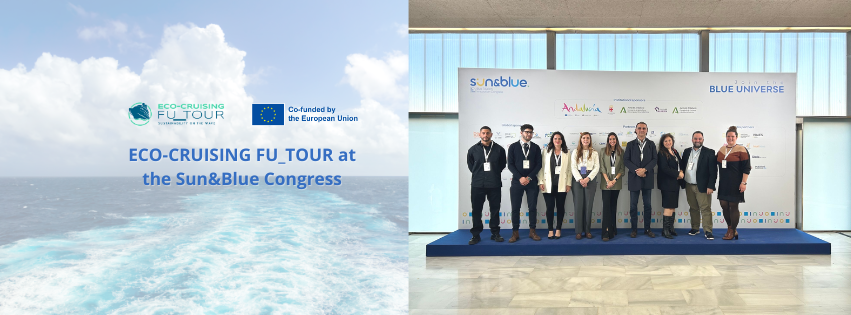
The final dissemination event of the ECO-CRUISING FU_TOUR Project was successfully celebrated on 21st November in Almería (Spain), during the Sun & Blue Congress , the most important annual meeting on Blue Tourism and Blue Economy in Europe, which brought together over 1.000 players in the blue tourism and blue economy value chain. The event, organized by ASCAM and titled " Sustainable Tourism on the Mediterranean ", was a unique opportunity to share the achievements of the ECO CRUISING FUTOUR project and highlight the sustainable practices being promoted in the Mediterranean cruising industry. It also created a space for meaningful discussions on the sustainable future of the cruising industry. The event began with the keynote ‘Sustainable Tourism & Cruising: A Holistic Vision’ given by Mr. Fabio Laborda, Manager of Fundación Bahía Almeriport, who highlighted the positive impact of sustainable tourism on local economic development, cultural preservation, and environmental protection, as well as improving the quality of life for host communities. Mr. Laborda talked about the Port of Almería, which is a crucial economic driver for the Andalusian region, supporting local industries, promoting tourism, and facilitating international trade. It is vital for the import/export of goods and serves as a significant employment hub. Next, X23, the Project Coordinator, explained the pivotal role of participatory methodologies when it comes to developping and implementing innovative solutions, giving an overview of the different methodologies employed during the implementation of the ECO-CRUISING FU_TOUR Project’s activities. X23 higlighted how engaging local communities through workshops and conversations on how to apply sustainability practices that support local economies and empowering residents to participate in decision-making is crucial for the successful implementation and sustainability of innovative practices. Collaboration with SMEs and local institutions also proves to be essential in order not only to ensure the successful implementation of sustainable practices but also to keep up to date with new skills emerging in the sector, ensuring targeted Capacity Building Programmes, answering local and labour market needs. Afterwards, a round table took place, where various industry stakeholders and project partners (CMMI, Green Evolution, SGPTV, WESTMed, LEANCUBATOR and Grupo Erre) discussed the trends and challenges of the next generation of cruises, with a special focus on sustainability and cutting-edge technology. The event concluded with an i mmersive virtual experience aboard a state-of-the-art cruise facilitated by CSM and showcasing the “Cruise, green and fun” eco-smart itinerary developed during the project implementation. This was an opportunity to explain how the inclusion of VR technology promotes eco-friendly tourism practices, by combining eco-conscious activities with cutting-edge technology to create memorable travel experiences tailored to the younger generations.
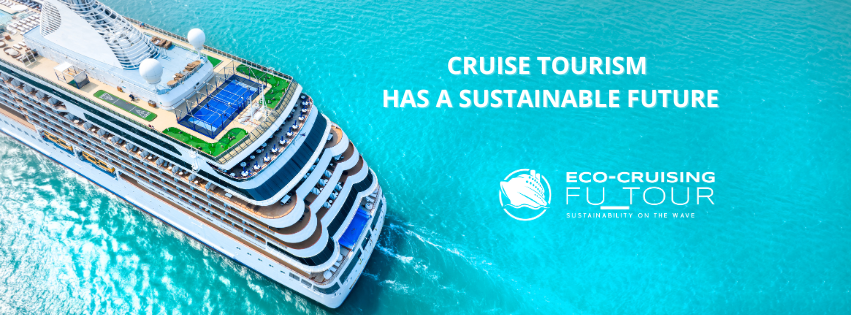
An swering to the growing number of costumers recorded in 2024, reaching over 32 million people choosing cruising for their holidays, 51 ships are scheduled for delivery between 2024 and 2028. Of these, 7 out of 10 will be powered by alternative fuels exclusively (e.g. LNG, bio-ethanol) or combined by multiple solutions, both alternative (e.g. LNG and hydrogen) and traditional (bio-ethanol and maritime diesel). In 2025, the delivery of the greatest number of units is expected (18 in total) and, consequently, also the introduction of a significant number of new beds (40% of the total 110,000 expected in the years taken into consideration). By dividing the units expected to be delivered based on capacity, it is highlighted that the high number of small ships, under 1000 passengers, equal to over half of the orders between 2024 and 2028 (51%). The demand for large tonnage ships (>3000 pax) is less marked but still present, which in the years taken into consideration represents 33% of the total (with a peak in 2025, equal to 8 ships expected to be delivered). In 2023, Barcelona confirmed itself as the first port in the Med area, with approximately 250,000 more passengers compared to Civitavecchia, in second place. While the Spanish port was slightly decreasing in ship calls, the Italian port increased by +3.3%. The podium was completed with Marseille, with an increase in passengers by +76.3%. Overall, in 2023 there were over 25.8 million passengers welcomed by the top 20 ports in the Mediterranean, with 9,000 calls and with all ports recording growth in the number of passengers, a trend for the entire Mediterranean. As in many other industries, modern technology has significantly revolutionized the cruise industry. This includes more widespread use of smart devices powered by the Internet of Things and a greater reliance on artificial intelligence, machine learning and software packages designed to support automation. This trend is in line with ECO-CRUISING FU_TOUR's activities, from the topics covered in the free Capacity Building Programme, to the activities included in the eco-smart package "Cruise, Green and Fun" now available for download at the following link .
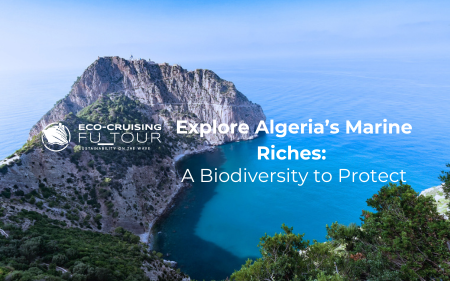
Algeria, known for its rich history and vast desert landscapes, is also home to an equally impressive but less celebrated natural asset: its diverse and vibrant marine ecosystems . Stretching along the Mediterranean coastline, Algeria boasts untapped potential for marine-based tourism that could position it as a top eco-tourism destination. As global interest in sustainable travel grows, Algeria’s marine biodiversity presents an opportunity to attract environmentally conscious tourists while promoting conservation and economic growth. Algeria’s Marine Biodiversity Algeria's coastline is a hidden treasure for marine biodiversity enthusiasts . The country's waters are home to an array of marine species , including dolphins, sea turtles , and unique fish species. Notable biodiversity hotspots like the Habibas Islands and the Gouraya National Park harbor rich ecosystems where coral reefs , underwater caves, and seagrass meadows thrive. Marine mammals , such as bottlenose dolphins , can often be spotted along the coast, adding to the allure for tourists interested in marine wildlife. Endangered species like the monk seal , one of the rarest in the world, also make Algeria’s waters a valuable conservation area. Algeria's coral reefs provide not only stunning underwater landscapes but also critical habitat for countless marine species. Although lesser-known than those in tropical destinations, these reefs are vital for both biodiversity and tourism . Sustainable Marine-Based Tourism This rich biodiversity is a significant asset that, if properly managed, could offer unique eco-tourism experiences for visitors worldwide. Sustainability must be at the heart of any marine-based tourism strategy to ensure the long-term preservation of Algeria’s fragile ecosystems. Sustainable marine tourism promotes environmental education, eco-friendly activities , and conservation while offering unforgettable experiences like snorkelling and scuba diving around Algeria's coral reefs, allowing tourists to explore marine life without causing harm. There are also opportunities for responsible marine wildlife tours , such as dolphin watching or birdwatching along the coast. Kayaking and eco-cruises offer low-impact ways to enjoy the beauty of Algeria’s waters, ensuring that tourism does not disrupt the natural balance of these marine ecosystems . Global Examples of Eco-Tourism Countries like Australia , with its Great Barrier Reef , and Costa Rica , a leader in eco-tourism , provide excellent models for Algeria to develop its sustainable tourism industry while protecting its marine habitats . Algeria’s coastal communities will play a crucial role in the development of marine-based tourism. By involving local populations in the tourism sector, there is potential for economic empowerment and environmental stewardship . Through community-based tourism , coastal residents can lead efforts in sustainable tourism while preserving their cultural heritage . These communities can act as custodians of their natural resources, offering tourists authentic experiences , such as guided tours of marine reserves, cultural exchanges , and traditional fishing expeditions . This approach not only fosters economic benefits but also promotes a greater appreciation for the importance of protecting marine biodiversity . Challenges and Conservation Efforts Algeria's future in marine-based tourism is bright. With its untouched marine landscapes and growing global interest in eco-tourism , the country is well-positioned to attract tourists looking for unique and sustainable travel experiences . Potential developments include investments in eco-lodges , marinas, and nature reserves that promote responsible tourism, as well as forming international partnerships with global eco-tourism organizations to develop sustainable tourism standards . Marketing initiatives that promote Algeria’s rich biodiversity and eco-tourism potential to international audiences could further strengthen the country’s appeal. Of course, with any tourism expansion comes the challenge of balancing growth with conservation . Algeria faces some key issues, including overfishing , coastal pollution , and the potential pressure of uncontrolled tourism on marine habitats . Addressing these challenges requires the implementation of stricter environmental regulations , such as establishing Marine Protected Areas (MPAs) where fishing and certain tourism activities are restricted. These zones will help preserve ecosystems while allowing sustainable tourism to thrive. Education campaigns targeting both tourists and locals on the importance of conservation can also play a crucial role in maintaining a healthy balance between tourism and environmental protection . Algeria’s rich marine biodiversity is a hidden gem waiting to be explored by eco-conscious travelers . With careful planning, sustainable practices , and community involvement , the country has the potential to become a prime destination for marine-based tourism . By protecting its marine ecosystems while promoting tourism, Algeria can achieve a delicate balance between economic development and environmental conservation , ensuring that future generations can enjoy the beauty of its coastal waters.
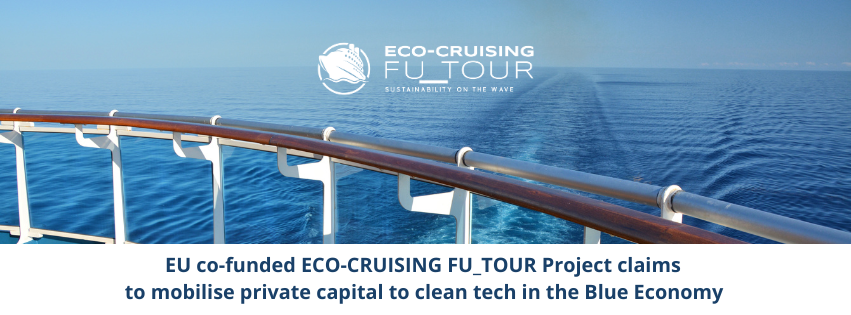
While carrying out the Project’s activities, the ECO-CRUISING FU_TOUR Consortium has spotted 4 key sectors of the Blue Economy characterized by a low rate of investment made by SMEs . These sectors are: Coastal & Maritime Tourism, Environment Protection & Regeneration, Shipbuilding & Refit, and Shipping & Ports. Investing in these 4 sectors is crucial to advance towards a sustainable transition in the cruise industry by achieving the goal of net zero emissions by 2050. Promoting innovation in maritime technology is at the heart of the cruise industry’s efforts to reduce its environmental footprint. It has made significant investments in developing green technologies and practices, including, for example, the provision of shoreside electricity (SSE) for ships or diversifying the cruises’ energy positions by combining multi-fuel engines. However, to accelerate the transition to a Blue Economy, the cruise sector claims to mobilize private capital to clean tech in the Blue Economy and to accelerate the sustainable transition. The BlueInvest Investor Report 2024. Unlocking the potential of the Blue Economy , published in March 2024 by the EU Blue Economy Observatory , explains the reasons why these sectors are less attractive to investors: Coastal & Maritime Tourism: Investments in the last period were concentrated with a higher proportion of angel investors. The investors come mostly from the EU as opportunities may be more local in character. Although coastal and maritime tourism employs almost 3,2 million people, the relatively lower deal activity is not completely surprising because of the specifics of this sector, which has a significant infrastructure and real estate components, lending it the perception of having a lower technological dimension compared to other Blue Economy sectors -such as renewable energy, blue tech or aquaculture. Environmental protection ®generation: It is the least developed sector in terms of number of deals and volume. The total amount of investments reached €87 million in the EU, the smallest sector in the Blue Economy on this criterion. The dominance of ‘public good’ objectives in this sector and the fact that many of the business models might not be considered investable by the private sector may explain the small number of deals. As public awareness grows and obligations for companies to preserve and regenerate the environment broaden, the ability of businesses to build valuable, defendable projects that are attractive to investors should progressively increase. Shipbuilding & Refit: The shipbuilding & refit industries are generally not a sector of interest for early and growth-stage equity investors because of their scale and maturity. The risk-to-return profile of most investments is more suited to larger-scale corporate investments or debt. Since shipbuilding tends to be located by default in very specific geographic locations, it is natural majority of its investors come from the host industry. Shipping & Ports: This sector shows relatively less deals’ dynamics, with several deals that doubled in the last 10 years. The report highlights the maturity of this sector, hence the investor’s perspectives on limited opportunities for ready-to-market innovations. Creating a stronger ecosystem of young companies and connecting them to opportunities in this sector will help attract greater investment from angel and early-stage investors. Barriers to develop blue ocean technologies ECO-CRUISING FU_TOUR also alerts about the socio-economic and technological obstacles to develop blue ocean technologies . For instance, as the EU Blue Economy Observatory warns, port infrastructures will require major upgrades to allow for the construction and the assembly of large subsystems (e.g., floating wind platforms). Similarly, the vessel fleet might not be able to respond to the demand despite the forecasted growth. In addition, conflicts of usage and other legal actions may jeopardize the realization of a project –sometimes by delaying the launching of the construction by several months/years–. According to the report, “these barriers represent a risk for investors and project developers that must be anticipated”. Geopolitical instability , energy insecurity (depletion of fossil fuels reserves) and environmental issues (pollution, climate change and biodiversity loss) define an unknown future in which it is difficult to foresee what the future energy mix will look like. The cruise sector has taken major steps towards sustainability prior to the pandemic. Many of the foremost cruise lines are making great efforts to reduce their environmental footprint by cutting emissions, conserving water, and improving disposal techniques. Furthermore, various cruise lines have pledged to eliminate single-use plastics and source goods from the local areas to help the local communities. However, there is too much to be done to minimize its impact on marine life and to move towards an eco-tourism model that preserves the natural environment. Apart from this, the complexity of the Mediterranean requires shared solutions and the inclusion of all the industry key players to unlock new business opportunities around the new eco-cruise tourism sector.
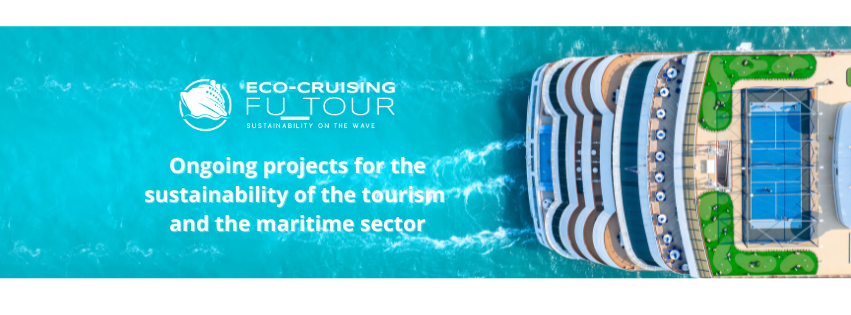
Sustainability in the maritime sector has been a major priority of the European Commission since 2013. This led to the development of the so-called #EUSeaBasinStrategies: the Atlantic Action Plan, the Common Maritime Agenda, targeting the Black Sea, and the WestMED Initiative. Starting from 2021, the European Maritime, Fisheries and Aquaculture Fund (EMFAF) has decided to fund flagship projects for each of the sea basin strategies. ECO-CRUISING FU_TOUR is one of the flagship projects funded within the WestMED Initiative . Other two projects of this EU Sea Basin Strategy have been selected and they are: EU WeMED_NaTOUR : coordinated by X23-The Innovation Bakery, this project aims at providing support via capacity building to WestMed tourism SMEs and related stakeholders and involving them in the design and development of school trip tourism packages to natural marine sites, remote coastal destinations, and protected areas in the Western Mediterranean basin. REBOOT MED stands for Recovering, Experiencing and Boosting eco-tourism in the WestMed area. This project is coordinated by Coopérative Petra Patrimonia Corsica and encourages public-private partnership co-defining Blue Economy Action Plans for the Recovery of the tourism sector and aims at creating new eco-tourism packages promoting cross border and interregional cooperation, with replication potential across the Mediterranean. To find out more about the WestMED Initiative and these flagship projects: https://westmed-initiative.ec.europa.eu/success-story-emfaf-tourism-flagship-projects/ Another project worth mentioning is " METAVASEA ", a five-year project coordinated by HELMEPA and involving 6 partners, among which the Cyprus Marine and Maritime Institute (CMMI) and the Cyprus Marine Environment Protection Association (CYMEPA). From the Greek word "Metavasi", meaning transition, the project aims at promoting maritime decarbonization infrastructure in Greece & Cyprus as well as support stakeholders in upskilling the workforce. Visit the website to discover more about the activities and support the green and digital transition: https://helmepa.gr/en/metavasea .
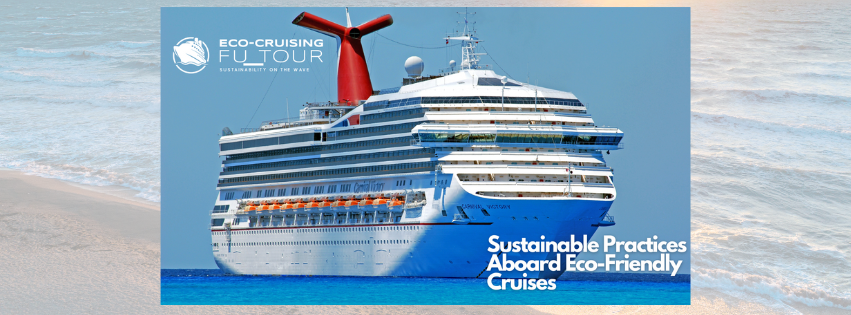
Eco-friendly cruises are redefining maritime tourism by offering innovative and sustainable experiences. Companies like Hurtigruten and Ponant stand out for their use of hybrid technologies and alternative fuels, significantly reducing CO2 emissions. Other itineraries include pristine destinations such as the Norwegian fjords and Antarctica, where passengers can engage in environmental awareness activities. Onboard, sustainable practices are implemented, such as recycling and sourcing local products. Here is a detailed overview of these initiatives: Recycling and Waste Management : Cruise companies implement advanced recycling programs to manage waste onboard. Recyclable materials such as paper, plastic, glass, and metals are sorted and processed to reduce the amount of waste sent to landfills. Additionally, state-of-the-art incinerators are used to treat non-recyclable waste in a secure and environmentally friendly manner. Reducing Water Consumption : Eco-friendly cruise ships use advanced technologies to reduce water consumption. For example, wastewater treatment systems are installed to purify water used onboard, allowing it to be recycled. Furthermore, measures such as the installation of water-saving showerheads and awareness programs to encourage passengers to reduce their water consumption are implemented. Use of Local and Sustainable Products : To support local economies and reduce the carbon footprint, cruise companies prioritize sourcing local and sustainable products. Onboard menus include fresh and seasonal ingredients from local producers. This practice not only reduces emissions related to the transport of goods but also encourages sustainable farming practices. Energy Efficiency : Eco-friendly cruise ships are equipped with cutting-edge technologies to improve energy efficiency. Energy management systems optimize the use of electricity onboard, reducing energy consumption. Ships may also be equipped with solar panels and hybrid propulsion systems, combining diesel and electric engines for a significant reduction in greenhouse gas emissions. Reducing Plastic Usage : To combat plastic pollution, many cruise companies have eliminated or significantly reduced the use of single-use plastics. Reusable alternatives, such as stainless-steel water bottles, bamboo straws, and compostable packaging, are offered to passengers. This initiative helps reduce plastic waste in the oceans. Passenger Awareness and Educatio n: Eco-friendly cruises integrate educational programs to raise passenger awareness of the importance of environmental conservation. Conferences and workshops led by environmental experts are organized onboard, providing information on marine biodiversity, sustainable travel practices, and current environmental challenges. Passengers are also encouraged to participate in eco-friendly activities, such as beach cleanups and educational excursions. Sustainable practices aboard eco-friendly cruises represent a significant step towards more environmentally friendly maritime tourism. By adopting innovative measures to reduce water and energy consumption, responsibly manage waste, and raise passenger awareness, these cruise companies set an example and contribute to the preservation of marine ecosystems for future generations. To learn more and discover eco-friendly cruises please contact the ECO-CRUISING FU_TOUR Consortium of Partners via email: info@ecocruising-fu-tour.eu
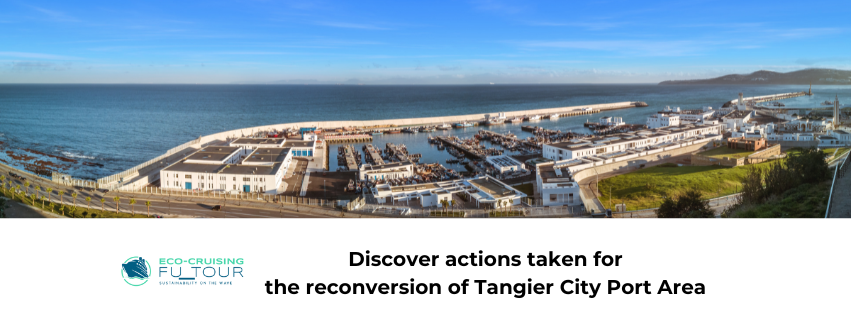
The Cruise industry faces many sustainability challenges, including waste management, greenhouse gas emissions, and the environmental impact of port activities. To this end, the role of all stakeholders in the value chain is very important. As part of the development of cruise activities at Tangier City Port, our commitment to stakeholders for the protection of the environment and biodiversity, and our active participation in the ECO-CRUISING FU TOUR Project aimed at paving the way for an environmentally friendly cruise industry, concrete improvement actions are undertaken daily within all departments to actively contribute to Sustainable Tourism. Throughout the reconversion of Tangier City Port Area, the environmental aspect has always been a major preoccupation, along with sustainable development and the preservation of nature. For this purpose, numerous studies have been conducted to ensure respect for the environment. Hereafter, are some of the achievements: Installation of a rainwater recovery and treatment system at the port before discharge into the sea Widespread use of LED lighting, reducing the port’s energy consumption by around 200.000 KWH/year and cutting maintenance costs Installation of the onshore power system at the Marina (400 A and 250 A service terminal for mega yachts) to prevent their machine from being switched on during their stay Installation of photovoltaic: 4500 m2 covered area, 1 GW (production/year), 650 t Co2 mass avoided For more information, please contact: Jamil Ouazzani Director of Marketing & Strategic Intelligence SGPTV SA (Tangier City Port Management Company) Email : jamil@tangerport.com
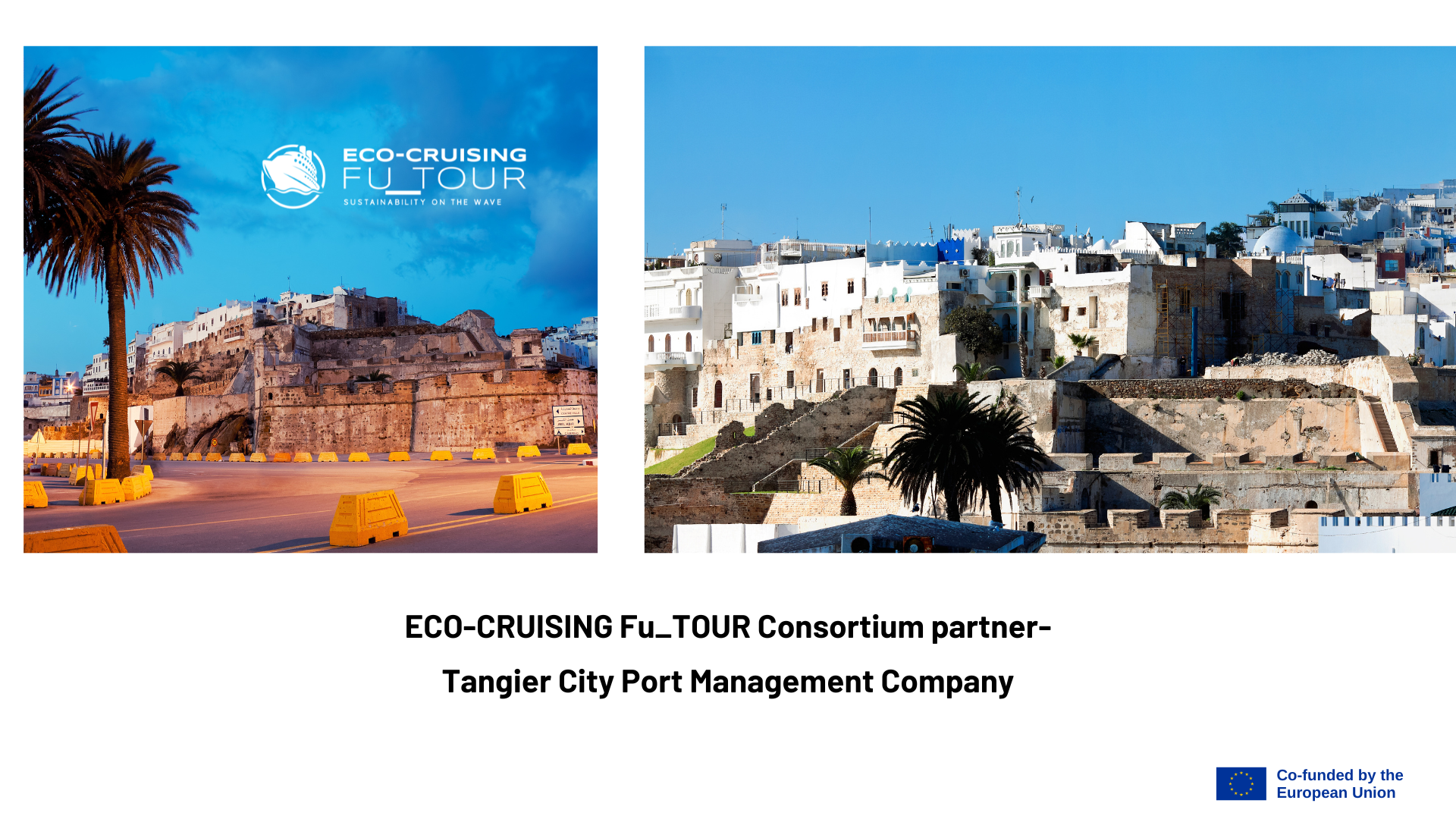
Since its conversion, the Port of Tangier has included the protection of the environment and biodiversity among its strategic development objectives. This sustainable, green, and intelligent port development has resulted in several concrete and regular actions over the last few years. The Port of Tangier City's participation in the ECO CRUISING FU_TOUR Project, co-financed by the European Union, aims to exploit the green and blue potential of SMEs in the tourism sector in the Western Mediterranean, to open up new business opportunities in the emerging eco-cruise tourism sector. Meetings with the entire maritime chain have been organized at the Port of Tangiers to raise awareness of sustainable cruise tourism. Within this framework, environmentally friendly excursions and activities have been programmed for cruise passengers calling at the Port of Tangier Ville. These include culinary experiences organized near the Port of Tangier in a magnificent traditional house located in the heart of the Medina. Ci-après 2 exemples organisés la PME ‘’Blue Door Cuisine’’ qui rencontrent de la part des croisiéristes un grand succès : Cooking Experience: Departure from the port By foot arrive at the local market Escorted by one of our Moroccan Ladies, arrive at Blue Door Cooking (3-in-1) Experience Return by foot to the port, arrival at port Tea & Bread Experience (Rue de la Kasbah) Departure from the port By foot arrive at the Kasbah public oven Escorted by one of our Moroccan Ladies, arrive at Blue Door Tea & Bread Experience Return by foot to the port, arrival at port On most cruise passage dates we can welcome 3 groups of 10 people each at the Kasbah and 2 groups of 10 people each at the Blue Doors Cuisine Rue de la Plage (Cervantes). Blue Door's Sustainability is based on ... "Staying local": Almost entirely local produce, fish, and meats purchased daily at the nearby public market (shopping is zero carbon) Proximity: Both of our locations are within walking distance of the port (transfers leave a zero carbon footprint) Social: High value on authentic exchange with local women and guest engagement through food, bread, and tea preparation Economic: Employees are rewarded fairly in terms of wages and benefits as we create 1-2 jobs every quarter Mindfulness in terms of food waste and plastic recycling: Built into our system Culture: Promotion of local artisans from our uniforms to our aprons - and items for sale Community engagement: in the planning stages of an all-staff commitment to volunteering through a local NGO For more information, pls contact: Jamil Ouazzani Director of Marketing & Strategic Intelligence SGPTV SA (Tangier City Port Management Company) Email : jamil@tangerport.com
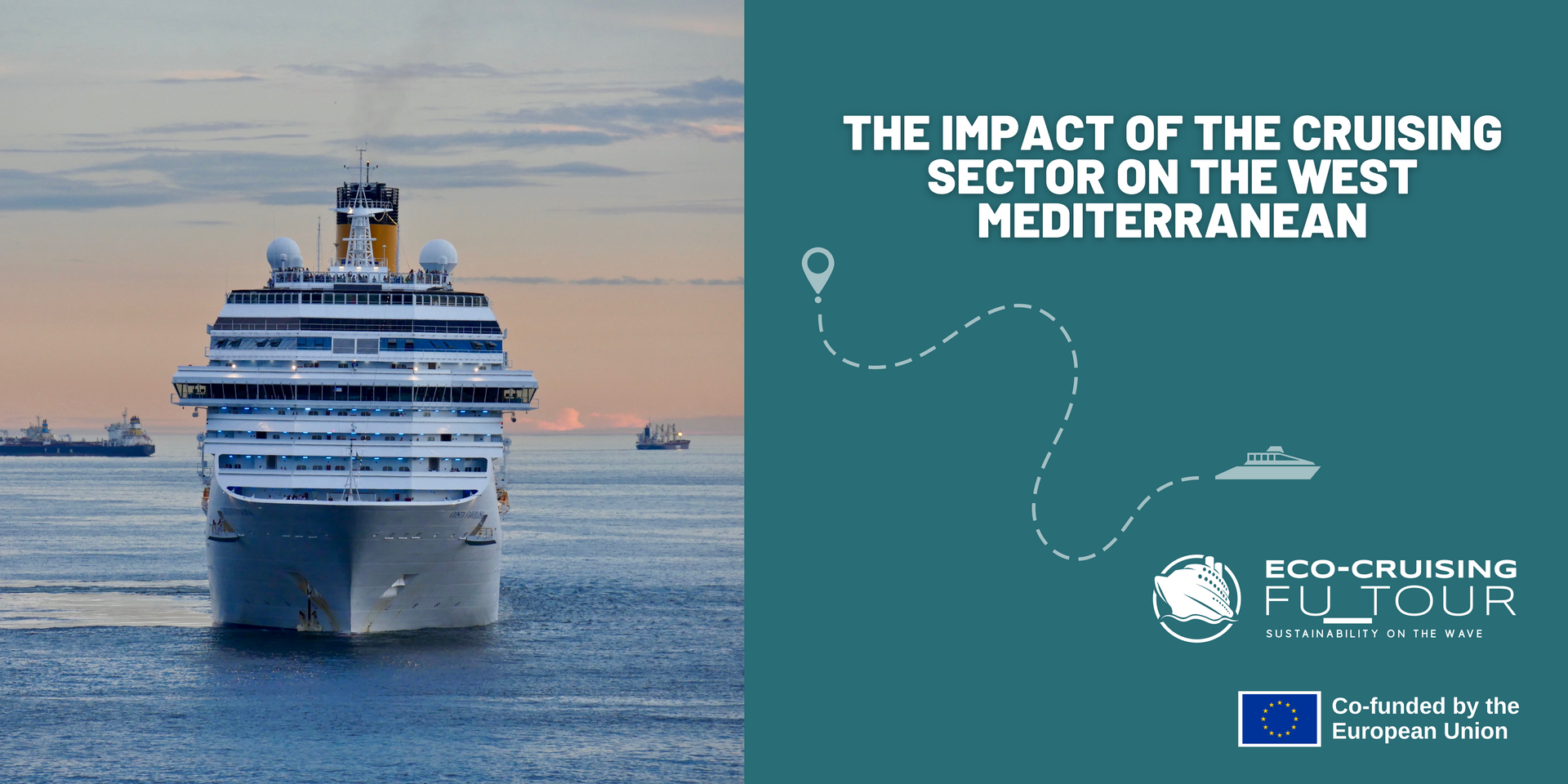
The cruising sector has become a significant player in the tourism industry, offering travelers a unique way to explore multiple destinations in a single journey. While cruising can bring economic benefits to the regions it visits, it also raises concerns about environmental impact, cultural preservation, and local community engagement, and the West Mediterranean is not an exception. Focusing on environmental sustainability, ECO CRUISING is changing the cruise sector into a more environmentally friendly sector! Let’s take a look at the concerns and the impact the cruising sector has on the region. One of the most pressing environmental concerns associated with the cruising sector is marine pollution. Cruise ships generate a substantial amount of waste, including sewage, wastewater, and solid waste, which can have detrimental effects on marine ecosystems. Discharge of untreated wastewater and release of pollutants can contribute to water pollution, harming marine life and degrading coral reefs and seagrass beds. Cruise ships also emit significant amounts of air pollutants, including sulfur dioxide, nitrogen oxides, and particulate matter. These emissions can contribute to poor air quality in port cities and coastal areas, posing health risks to local communities and contributing to climate change. The large size of cruise ships and the influx of tourists they bring can contribute to coastal erosion and habitat destruction. Anchoring in sensitive marine areas, such as coral reefs and seagrass meadows, can damage these fragile ecosystems, reducing their resilience and biodiversity. While cruising can bring economic benefits to port cities and tourist destinations, the distribution of these benefits is often unequal. Local communities may not see a proportional share of the economic gains, leading to economic disparities and social tensions. Hence knowing how to practice sustainable tourism is really important. To mitigate the environmental impact of cruising, many cruise lines are adopting sustainable practices, such as wastewater treatment systems, low-emission engines, and eco-friendly cleaning products. Certification programs, like Green Marine and Blue Flag, help identify cruise lines that adhere to rigorous environmental standards. ECO CRUISING has also created the Capacity Building Programme for the SMEs in the sector, raising awareness among cruise workers about the environmental and cultural significance of the destinations and highlighting the importance of protecting the West Mediterranean's natural and cultural resources. The cruising sector has a complex and multifaceted impact on the West Mediterranean, encompassing environmental, cultural, and social dimensions. While cruising offers an opportunity to explore the beauty and diversity of the region's coastal areas and islands, it also poses significant challenges that require thoughtful management and responsible tourism practices. By adopting sustainable operations, engaging with local communities, and promoting awareness among passengers, the cruising sector can play a vital role in preserving the West Mediterranean's unique natural and cultural heritage for future generations.
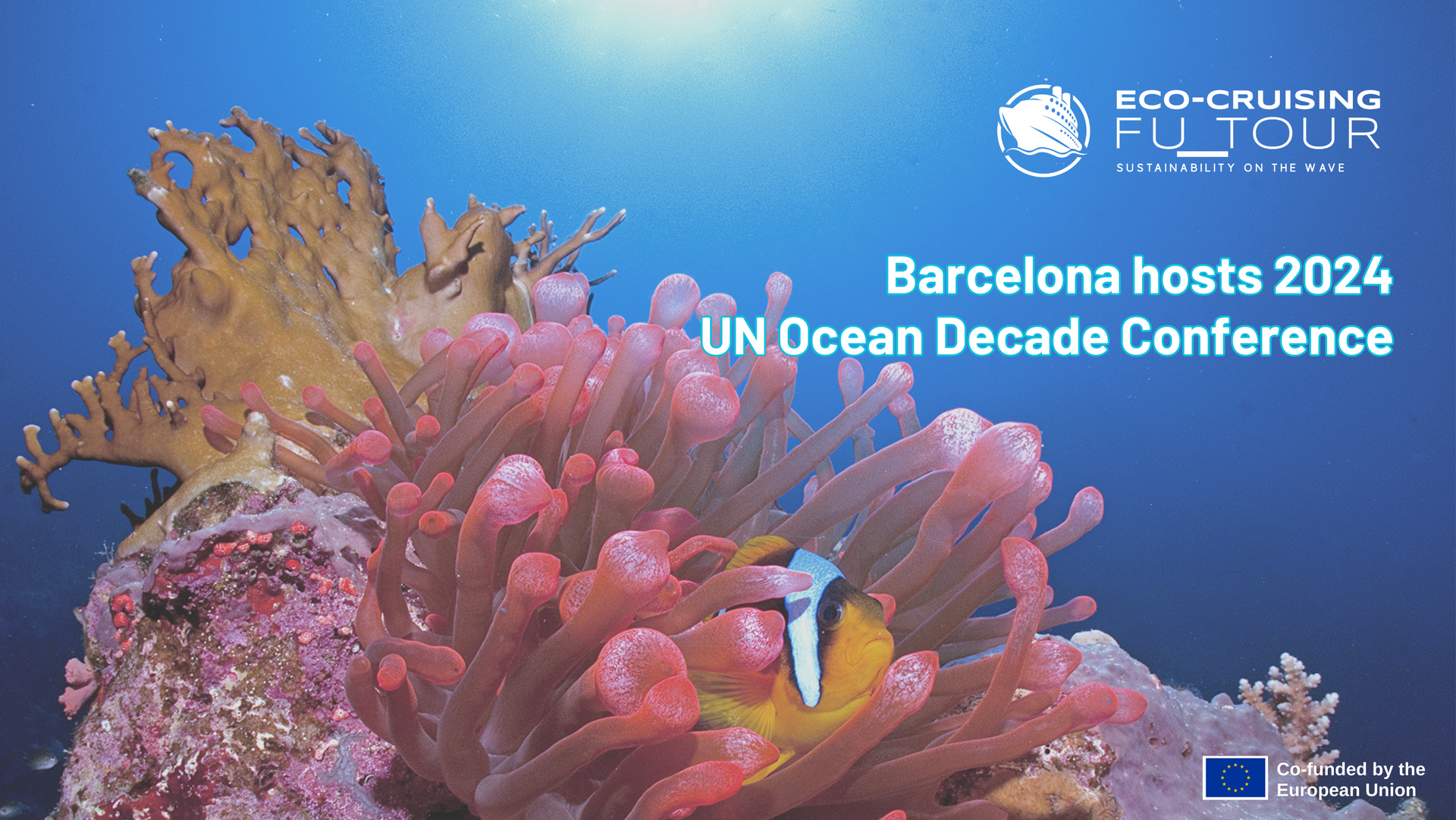
A new chapter of global ocean action started this week in Barcelona. From 10 to 12 April, the city hosted the UN Ocean Decade Conference, the global conference co-organized with UNESCO’s Intergovernmental Oceanographic Commission (IOC/UNESCO) which marked a pivotal moment to celebrate the achievements of the Ocean Decade Community and also to set joint priorities in the upcoming years. Titled ‘Delivering the science we need for the ocean we want’, the Conference held in Barcelona brought together 40 international speakers from diverse backgrounds ranging from scientific and political to economic and social. All of them identified the priorities for the Ocean Decade to generate the knowledge needed for science-based solutions related to global challenges, such as climate change, food security, biodiversity conservation, sustainable ocean economy, pollution and natural hazards. The Conference programme was structured in four thematic sessions based on the 10 Ocean Decade Challenges. The first thematic session, titled ‘Science and Solutions for a Clean, Healthy and Resilient Ocean’, focused on marine pollution, ecosystems and the ocean-climate nexus. The sustainable ocean economy, food and resilient communities was the focus of the second session, titled ‘Science and Solutions for a Sustainable and Resilient Ocean Economy’. The third session, ‘Science and Solutions for a Safe and Predicted Ocean’, was dedicated to ocean observation, forecasting and early warning systems. The last session, titled ‘An Inspiring and Engaging Ocean for all’, was related to capacity development, ocean literacy, indigenous and local knowledge and cultural heritage. María del Carmen García Martínez, Director of the Spanish Institute of Oceanography (IEO-CSIC), pointed out that “the knowledge, management and solution of problems associated with the seas cannot be solved by a city or a country alone and must be addressed through multilateralism and international organizations such as UNESCO and its Intergovernmental Oceanographic Commission.” Within the celebration of the Conference, Barcelona became the world capital of the blue economy and the sustainable development of the oceans. All the speakers stressed on Catalonia’s long tradition as a center of marine research and ocean science and as a maritime hub, with a strong commitment to sustainability. For instance, Barcelona has adopted a blue economy strategy which promotes the creation of companies and quality jobs, in line with environmental sustainability. Eco-Cruising Fu_Tour partner ASCAME, the Association of Mediterranean Chambers of Commerce, gave support to the Conference. In fact, one of the main challenges of ASCAME's 2024 Action Plan is to mobilize the private sector and foster multilateral cooperation to promote the economic development of the Mediterranean based on the preservation of marine ecosystems and environmental sustainability. For ASCAME, the blue economy plays a key role in the prosperity of the Mediterranean region. Watch the presentation of the 2024 Ocean Decade Conference by the UNESCO!
